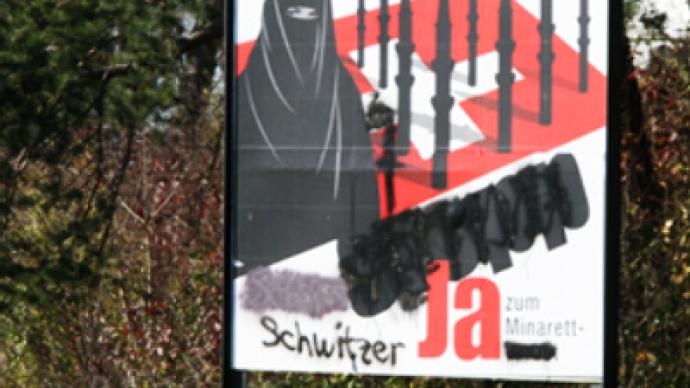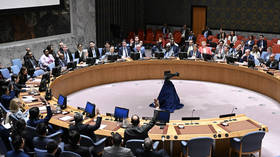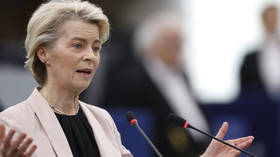Towers of contention: Switzerland's minaret controversy

For Swiss Muslims, Eid al-Adhal [festival of sacrifice], holds additional significance this year. The third day of the festival coincides with a controversial referendum, which some see as a vote on Islam itself.
Eid al-Adhal – a festival when livestock is sacrificed and meat is shared with family, neighbours and the poor – traditionally follows the Hajj, when throngs of Muslims make their once in a lifetime pilgrimage to Mecca. In Switzerland, a black cloud hangs over this year’s celebrations, as voters go to the polls to decide whether the country should ban the construction of new minarets (mosque towers originally used by muezzins to call the faithful to prayer).
Switzerland boasts a unique democratic system which provides its citizens unparalleled influence on the laws and government of their country. Proposed constitutional or legal amendments must first be subject to a popular referendum before they can become law. One of the cornerstones of this system is the freedom for citizens (or more often political parties) to propose referenda on any matter of state: all they require for this are 100,000 voters’ signatures collected over 18 months.
Religion on the agenda in a secular state?
Although the current referendum asks citizens to vote on two proposals, only one is firmly on the minds of voters. The right-wing SVP’s (Swiss People’s Party) controversial proposal for a ban on minaret construction has put the small Alpine nation in the global spotlight. It has also left many Muslims feeling victimized and unwelcome in the country they call home.
Vedat ÇaÄŸlar is a Turkish-born engineer. He has lived in Switzerland for over seven years and speaks the local language fluently. With an MSc in Telecommunications, the 36-year-old belongs to a highly-skilled segment of the immigrant workforce essential to Switzerland’s science and technology-driven economy. As a practising Muslim, he also belongs to the 4.3% of Swiss residents, who – according to census data from 2000 – make up the country’s third-largest religious community.
Vedat is sceptical of the SVP’s campaign. He sees it as flawed, ill-informed and a danger to Swiss social cohesion. Switzerland has around 160 mosques, of which only four have minarets. “This is not about minarets,” he said concerning the referendum. “There is no such thing as a homogenous Islamic culture. A minaret in Turkey is different from a minaret in Syria or Qatar, so what are we talking about? What is a minaret, but an architectural element?”
In justifying the SVP proposal, Patrick Freudiger claims that minarets “have a political dimension, which current planning legislation does not take into consideration.”
Citing minarets as an “expression of the fact that Muslims are no longer satisfied with the freedom of practising their religion and require increased influence in society,” and “an increasing tendency towards Islamification in Europe,” the SVP sees the proposal as a means to strengthen integration efforts.
Following the July 2005 terrorist attacks in Britain, integration of immigrant communities is seen by many western European politicians as a means of preventing future home-grown terrorist attacks. Previous laissez-faire immigration policies are being reviewed; with greater emphasis placed on language skills, integration, and helping immigrant minorities play an active role in the culture of their adopted home.
Sailing close to the wind
The SVP campaign differs from this inclusive approach by targeting a specific religious group.
Their posters, featuring a veiled woman and a series of black minarets on a Swiss flag, have been pasted to countless billboards. In a campaign which plays on stereotypes and fear, for many the posters tread a fine line between xenophobia and racism: As the courts confirmed following a complaint against an SVP in 2007, Swiss law forbids racism, but not xenophobia. Switzerland’s 26 cantons are divided on the subject; with some, such as Zürich and Luzern allowing the posters, and cantons such as Basel Stadt and Fribourg banning the provocative and racist imagery.
“When I see these posters, I feel disappointed and sad,” Vedat explained to RT, adding, “They are a waste of time; a waste of energy, but above everything else they make me worried for children who see such images. They will grow up believing that it is acceptable to single out particular groups of society. In allowing this campaign I am worried that Switzerland is risking the peace of future generations. The vote is a waste of time: It dominates the political agenda with an irrelevant side-issue, which diverts attention from more serious matters.”
Residents without a voice
Like many foreign workers in Switzerland, Vedat is not a Swiss citizen and therefore cannot take part in the vote. Despite this, he hopes that his adopted country will use the opportunity to make a stand against discrimination and vote against the SVP proposal.
“It is not important whether the proposal will be accepted or not. For me, even if only 2% vote in favour, I would still be disappointed. Now is an opportunity for Swiss citizens to make a stand. [The SVP] are damaging Switzerland’s reputation, dividing society, and planting the seeds of future problems.”
Opponents to the SVP proposal agree. Swiss Jewish and Christian religious organizations have united in condemning the proposal as an infringement of religious freedom. In August, the Swiss Federal Council (the executive authority) in which the SVP holds one of the seven seats also issued a statement against the proposed ban.
“The popular initiative against the construction of minarets has been submitted in accordance with the applicable regulations, but infringes guaranteed international human rights and contradicts the core values of the Swiss Federal Constitution. Such a ban would endanger peace between religions and would not help to prevent the spread of fundamentalist Islamic beliefs. In its opinion, passed on Wednesday [August 26], the Federal Council therefore recommends that the Swiss parliament reject the initiative without making a counter-proposal.”
Opinion still divided
Despite such influential opposition to the proposal, Swiss voters remain split. The SVP generally enjoys strong popular support and significant financial backing. A recent poll of voters by leading research and polling institute “gfs.bern” put 37% of people in favour of the ban, with 53% opposed and 10% still undecided. The survey of 1000 people was carried out between November 9 and 14 on behalf of the Swiss Broadcasting Corporation.
Vedat has little choice but to wait for the outcome of the vote. In spite of his feelings on the minaret vote, he strongly supports the Swiss democratic system. For him, the future success and prosperity of this small Alpine country lies in its diversity.
“I am optimistic. I remain hopeful that common sense, mutual understanding and respect will prevail. Just look at the Swiss Under-17 football team: Of 21 members, 13 are of foreign origin. They are now world champions. This proves [that] when foreigners are integrated, well educated and given the chance, they can help Switzerland and the Swiss people achieve anything. This vote is an opportunity for people to choose whether to follow this path, or to be misled down the path of exclusion, prejudice and social disharmony.”
Matthew Beattie for RT













